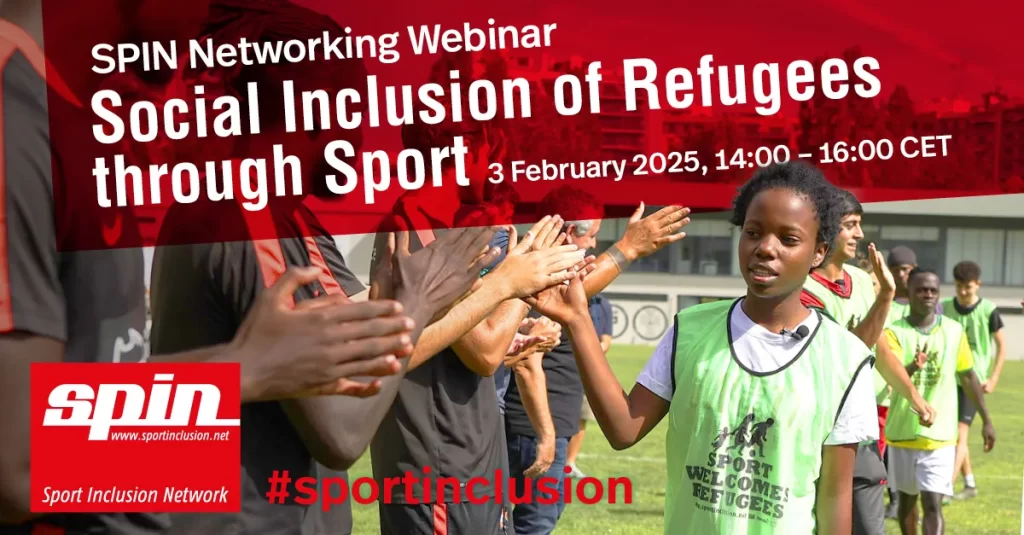
A successsful premiere
As the first of its kind, the SPIN Networking Webinar on 3 February 2025 brought together the Sport Inclusion Network community and further stakeholders in the field. Participation ranged from stakeholders from Kenya to Finland and from grassroots (sport) organizations to the Council of Europe.
The full recording of the Webinar is available here.
The webinar was opened by SPIN Network Coordinator Stefan Belabed stating that this session marked the beginning of a series of international exchanges around sport and social inclusion. The aim is to foster the sharing of good practices, discuss trends and challenges, and amplify the impact of the various projects and activities.
SPIN Chair Kurt Wachter then introduced the history of the network, its members, goals and main tools. His presentation is available here.
The following Round Table on “Social Inclusion of Refugees through Sport – Exchange of experience and learning from each other” featured a diverse group of social inclusion experts and activists:
Experts
- Raymond Onyango and Chris Kach (Kayole Starlet Football Club) on inclusivity and social justice in Nairobi, Kenya
- Petar Rosandić (SOS Balkanroute) on human rights violation of refugees in the Western Balkans Region and active solidarity
- Claudia Nystrand (Monaliiku) on the project “OUTdoor for INclusion: Improving resilience and integration for refugees and migrant women through outdoor experiences”
In 3 panel rounds, speakers responded to the following questions:
- What is the current situation regarding your special target group? What challenges are you confronted with in your work?
- What works well? Which experiences and good practices do you like to share?
- What do you recommend to others working in the same field?
This round was followed by an open floor exchange with questions from participants.
Empowering marginalized communities
In the panel discussion and open floor, participants of the webinar heard from a variety of stakeholders who each contribute a unique view on the subject and of sport and social inclusion.
Claudia from Monaliiku shared their strategies on empowering women with migrant backgrounds to integrate into Finland through sports. The main challenges in this endeavour include language barriers and economic thresholds.
Petar from SOS Balkanroute discussed their work in supporting local helper networks in Bosnia and Herzegovina. Their main concern is the rise of a dehumanizating discourse around refugees as well as severe pushbacks from Croatian police.
Raymond and Chris shared their work with the Kayole Starlet Football Club in Nairobi, Kenya, highlighting challenges such as limited funding, social and cultural barriers, and uncertainties in policies. Chris’ perspective on transgender athletes was particularly enriching for the discussion.
Speakers also discussed positive experiences, including community engagement, organizing local tournaments, and empowering participants.
Petar emphasized the importance of giving refugees a voice and recognizing their agency, citing the example of FIFA-licensed referee Ibrahim Rasool from Afghanistan.
Overall, speakers agreed on the importance of consistency, patience, and disseminating results in their work. They also emphasized the need for advocacy and lobbying to create structural changes.
Benjamin Dragolj, representing SPIN member Igrajmo Zajedno Inicijativa (Bosnia and Herzegovina), shared his experience working with refugees in camps and his challenges with international organizations like the International Organization for Migration (IOM) administering certain facilities. Pero echoed Benjamin’s sentiment about the difficulties of working with such entities in simply getting access to people for sport and social inclusion activities. Raffaella Chiodo-Karpinsky from Unione Italiana Sport Per tutti (Italy) discussed her organization’s advocacy work with international organizations and local institutions, highlighting successful activities in Bolzano and Torino. Claudia expressed the challenges of working with refugees in Finland due to the lack of a large refugee population and the difficulties in cooperation with authorities.
Finally, Kurt (VIDC, Austria) shared an additional success story story, the case of Saman Soltani, an Iran-born refugee athlete who participated in the IOC refugee team in Paris 2024 and found her way to being awarded the Austrian citizenship with the support of SPIN member VIDC.
Wrap-up and next steps
Following the vivid contributions by speakers and participants, SPIN Network Coordinator Stefan Belabed wrapped up the session and outlined the next steps in further developing the network and increase its impact:
- Further develop SPIN’s communication and outreach efforts (LinkedIn page, newsletter, etc.)
- Continue to advertise membership opportunities and benefits
- General Assembly (hybrid event) in early summer of 2026 in Lisbon, Portugal
- Planning the next SPIN Networking Webinar in the second half of 2025 through a participatory
SPIN Network
Sport should be equally accessible for all in society. However, marginalized groups, including refugees, migrants, and ethnic minorities – particularly women and girls – face barriers when participating in sport and physical activities. The international Sport Inclusion Network (SPIN) has been formed to address these barriers along with often intersectional dimensions of discrimination. Our goal is to make full use of sport as a means for social inclusion and integration. A key focus of the SPIN network is to support, empower and capacity-build grassroots initiatives and minority organisations.
Join the SPIN network
Your organization is active in the field of sport and social inclusion? You want to contribute to the work of SPIN and you are interested in joining the SPIN network as a member organisation? Find out more!